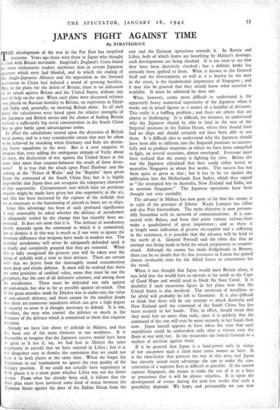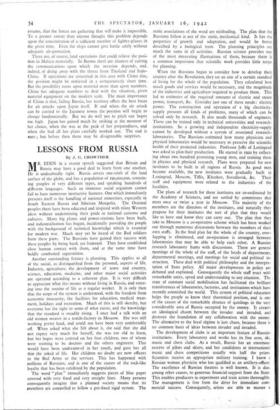JAPAN'S FIGHT AGAINST TIME
By STRATEGICUS In effect the calculations turned upon the diversion of British naval power, and to a very considerable extent that may be taken to be achieved by attacking when Germany and Italy are detain- ing heavy squadrons in the west. But is it over sanguine to imagine that, even adding the ambiguous attitude of Vichy about its navy, the declaration of war against the United States at the same time more than counter-balances the result of these diver- sions? It is true that the attack upon Pearl Harbour and the sinking of the 'Prince of Wales' and the 'Repulse' have given Japan the command of the South China Sea; but it is highly improbable that Japan does not recognise the temporary Character of that superiority. Circumstances into which later on pertinent enquiry might be made have given her also superiority in the air, and this has been increased by the capture of the airfields that are as necessary to the functioning of aircraft as bases are to ships.
Since this advantage has been of such profound significance it may reasonably be asked whether the defence of aerodromes is adequately settled by the change that has recently been an- nounced. It does not seem that it is. The defence of aerodromes clearly depends upon the command to which it is committed; but to dismiss it in this way is much_ as if one were to ignore the immense difference that weapons have made in modern war. The essential aerodromes will never be adequately defended until it is finally and completely grasped that they are essential. When this is fully recognised the greatest care will be taken over the siting of airfields with a view to their defence. There are certain evils that we derive from the thoroughly sound concentration upon deep and elastic defence. It must still be realised that there are some positions of cardinal value, some that must be not the .periphery, but the core of all defensive schemes; and among these are aerodromes. These must be defended not only against ground-attack, but also as far as possible against-air-attack. One of the greaLmistakes made by Douhet was to under-rate the value of anti-aircraft defence; and there cannot be the smallest doubt that there are numerous expedients which can give a high degree of security to areas it is- thought necessary to defend. It is not, therefore, the men who control the defence so much as the character of the defence which is conunitted to them that requires attention.
Already we have lost about r7 airfields in Malaya, and that has been one of the main elements in our weakness. It is impossible to imagine that the Japanese success would have been as great as it has if, say, we had had in Malaya the same superiority in aircraft that we have enjoyed in Libya ; but it is not altogether easy to dismiss the contention that we could not have it in both places at the same time. When we forget the limitations in our rearmament we ignore the true quality of the military position. If we could not actually have superiority in both places it is a moot point whether Libya was not the better Choice. From what has already been said, it follows that the Axis plan must have involved some kind of nexus between the Japanese thrust against the door of the Indian Ocean from the
east and the German operations towards it. In Russia and Libya, both of which fronts are benefiting by Malaya's shortage, such developments are being checked. It is too soon to say that they have been decisively checked ; but a definite brake has certainly been applied to them. What is known to the General Staff and the Government, as well as it is known by the man in the street, is the fundamental importance of Singapore ; and it may also be granted that they should know what material is available. It must be admitted he does not.
What, however, seems more difficult to understand is the apparently heavy numerical superiority of the Japanese when it works out in actual figures as a matter of a handful of divisions. This really is a baffling problem ; and there are others that are almost as challenging. It is difficult, for instance, to understand why the Japanese should be able to land in the rear of the Imperial positions in the Indian Ocean, where they should have had no ships and should certainly not have been able to use them. It is difficult also to understand why the Japanese should have been able to infiltrate into the Imperial positions so success- fully and so produce situations in which we have been compelled to fight, on several occasions, almost enveloped. Everyone must have realised that the enemy is fighting for time. Before the war the Japanese calculated that they could either invest or neutralise Singapore in about five weeks. The success has not been quite as great as that ; but it has to be set against the infiltration into the Netherlands East Indies, which they regard as "the strategical key to Australia, New Zealand and India, not to mention Singapore." The Japanese operations have been thought out very carefully.
The advance in Malaya has now gone so far that the enemy is in sight of the province of Johore. Kuala Lumpur has fallen and also Port Swettenham. The main objective is now presum- ably Seremban with its network of communications. It is con- nected with Bahau, and from that point various railway-lines make a quadrilateral of great importance ; and as there is at length some indication of greater air-support and a stiffening in the resistance, it is possible that the advance will be held to the north of it. General Pownall said the other day that an attempt was being made to hold the attack preparatory to counter- attack. Although the enemy has made bridgeheads in Borneo, there can be no doubt that the fine resistance in Luzon has gained almost invaluable time for the Allied forces to concentrate for the recoil.
When it was thought that Japan would meet Britain alone, it was held that she would have to operate as far, south as the Cape of Good Hope and would need to block the Suez Canal. It is doubtful if such excursions figure in her plans now that the United States is also involved. The extension of hostilities so far afield will probably be left to Germany. It is also difficult to think that there will be any attempt to attack Australia and New Zealand until the command of the South China Sea lies more securely in her hands. This, in effect, should mean that they need fear no more than raids, since it is unlikely that the command of the seas will ever be more securely in her hands than now. Japan herself appears to have taken the view that such expeditions could be undertaken only after a victory over the fleets at war with her. In the meantime she looked forward to a warfare of attrition against them.
If it be granted that Japan is a land-power only in virtue of her sea-power such a clash must come sooner or later. It is the time-factor that governs the war in this area, and Japan has cleverly seized every advantage she can to make the con- centration of a superior fleet as difficult as possible. If she cannot capture Singapore, she means to make the use of it as a base so precarious that it will be almost valueless. It is upon the development of events during the next few weeks that such a possibility depends. We hope, and presumably we can now assume, that the forces are gathering that will make it impossible. To a greater extent than anyone thought this problem depends upon the concentration of a sufficient number of fighter-planes in the given time. Even the ships cannot give battle safely without adequate air-protection.
There are, of course, land operations that could relieve the posi- tion in Malaya materially. In Burma there are chances of cutting the communications upon which the invasion depends, and. indeed, of doing away with the threat from Thailand and Indo- China. If operations are concerted in this area with China also, the position might be retrieved in a comparatively short time. But the possibility turns upon material more than upon numbers. China has adequate numbers to deal with the situation, given material equipment on the modern scale. The main importance of China is that, failing Russia, her territory offers the best bases for air attacks upon Japan itself. If and when. the air attack can be carried to the Japanese towns the position will begin tO change fundamentally. But we do well not to pitch our hopes too high. Japan has gained much by striking at the moment of her choice, when she was at the peak of her preparedness, and when she had all her plans carefully worked out. The end is sure ; but before then there may be disagreeable surprises.



























 Previous page
Previous page